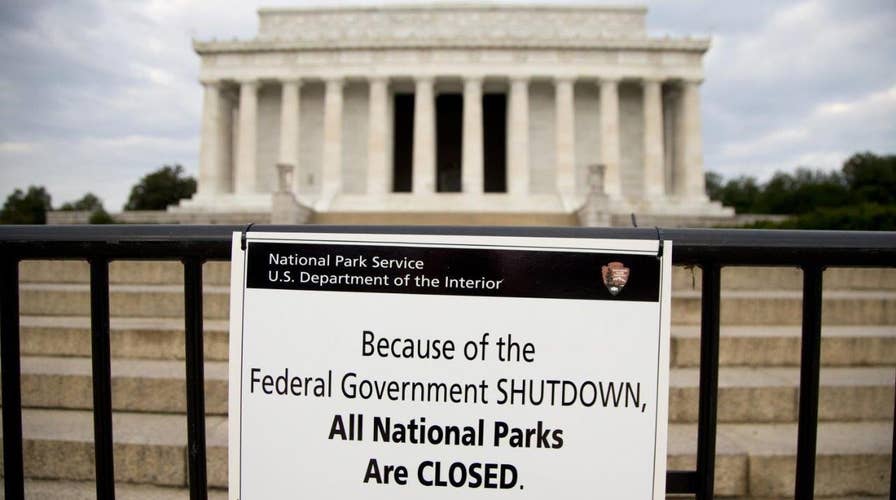Congress returns to looming deadline to avoid gov't shutdown
Chief congressional correspondent Mike Emanuel reports from Capitol Hill
Congress returns to Washington this week to take on the now-familiar task of passing an 11th-hour spending bill to avert a government shutdown, with President Trump’s promised border wall emerging this time as the big sticking point between Democrats and Republicans.
Trump tweeted several times about the issue Sunday, with one tweet saying Democrats don't want budget money paying for the wall "despite the fact it will stop drugs and very bad MS-13 gang members."
The deadline to avert a shutdown is Saturday, Trump's 100th day in office, which has increased pressure on the GOP-controlled Congress to also pass an ObamaCare repeal and replacement plan after failing to do so in March.
Congress OKs Planned Parenthood funding crackdown, as Pence breaks tie
In exchange for funding Trump's planned wall along the U.S.-Mexico border, congressional Democrats want any ObamaCare overhaul bill to continue to include subsides for health insurance companies that helped low-income people afford health policies.
The payments are a critical subsidy and the subject of a lawsuit by House Republicans. Trump has threatened to withhold the money to force Democrats to negotiate on health legislation.
Though Republicans have control of Congress, they have yet to send the GOP president a single major bill, such as an ObamaCare overhaul.
In addition to the wall, Trump also hopes to use the $1 trillion catchall spending bill to salvage victories on a multibillion-dollar down payment on a Pentagon buildup and perhaps a crackdown on so-called sanctuary cities that refuse to cooperate with immigration enforcement by federal authorities.
House Speaker Paul Ryan, R-Wis., has indicated that his priority is avoiding a politically unpopular shutdown, like the one in fall 2013 over ObamaCare funding, for which voters largely blamed Republicans.
“I don’t think anyone thinks a shutdown is desirable,” Mick Mulvaney, director of the White House Office of Management and Budget, told “Fox News Sunday.”
Rank-and-file Republicans received few answers Saturday on conference call by top House GOP leaders, who said deals remained elusive on both health care and the spending measure, with no votes scheduled yet.
A temporary measure could be needed to prevent a shutdown and buy time for more talks.
Democratic support will be needed to pass the spending measure, as Republicans fear taking the blame again if the government shuts down on their watch.
"We have the leverage and they have the exposure," House Minority Leader Nancy Pelosi, California, told fellow Democrats on Thursday on a conference call, according to a senior Democratic aide.
Pelosi wants the spending bill to give the cash-strapped government of Puerto Rico help with its Medicaid obligations. Democrats are also pressing for money for overseas famine relief, treatment for opioid abuse, and the extension of health benefits for 22,000 retired Appalachian coal miners and their families.
Mulvaney also told Fox News on Sunday: “We are offering to give Democrats some of their priorities. They made it very clear that they want these cost-sharing reduction payments as part of ObamaCare. We don't like those very much, but we have offered to open the discussions to give the Democrats something they want in order to get something we want.”
The White House and Democrats each have adopted hard-line positions on Trump's $1 billion request for a down payment on construction of the border wall, a central plank of last year's campaign.
Talk of forcing Mexico to pay for it has largely been abandoned. But in an interview with The Associated Press on Friday, Trump stopped short of demanding that money for the project be included in the must-pass spending bill.
GOP leaders have shown no desire to revisit ObamaCare until they're assured they have enough votes to succeed, a point Ryan reiterated to lawmakers Saturday, according to participants in the call.
An initial attempt in March ended in a legislative train wreck, stinging Trump and Ryan. The measure would have repealed much of Obama's 2010 overhaul and replaced it with fewer coverage requirements and less generous federal subsidies for many people.
Two leaders of the House GOP's warring moderate and conservative factions devised a compromise during the recess to let states get federal waivers to ignore some requirements of the health law. Those include one that now requires insurers to cover specified services such as for mental health, and one that bars them from raising premiums on seriously ill patients.
But there are widespread doubts that the new attempt has achieved the support it needs.
Rep. Dan Donovan, R-N.Y., an opponent of the bill, said last week that "it doesn't cure the issues that I had concerns" about. The moderate said his objections included changes to Obama's law that would still leave people with excessive out-of-pocket costs.
The potential amendment was brokered by Rep. Mark Meadows, R-N.C., who heads the conservative House Freedom Caucus and Rep. Tom MacArthur, R-N.J., a leader of the moderate House Tuesday Group.
The Associated Press contributed to this report.





